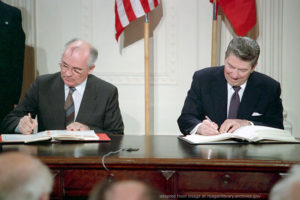RUSSIALINK: “‘The Human Factor’ Shines New Light on Recent History; Author Archie Brown’s book expands our understanding of one of history’s key periods” – Moscow Times

(Moscow Times – themoscowtimes.com – Felix Light – Oct. 11, 2021)
How important was the true-believing communist son of Stavropol peasants, the actor son of a Midwestern traveling salesman, or the staid, provincial daughter of a Lincolnshire shopkeeper? In his newest book, “The Human Factor: Gorbachev, Reagan, and Thatcher, and the End of the Cold War,” Professor Archie Brown, who might be considered the dean of Western Soviet experts, comes out with a novel and yet nuanced argument for understanding the role of political leaders in historical processes.
Coming after his seminal books on world communism, Mikhail Gorbachev, and the nature of political leadership, Professor Brown’s latest work is an investigation of the role of individual political leaders, including Gorbachev, in the end of the Cold War and the collapse of the U.S.S.R.
And yet, if “The Human Factor” seems a natural continuation of Brown’s previous work, it is a richly researched and originally-framed contribution to a period of history that is still unaccountably poorly understood.
The title should not deceive. There is no hero worship of Reagan, Thatcher, or Gorbachev here. Brown’s central argument is not that individual Great Men (and, in this case, a Great Woman) might shape history on their own.
The idea, still popular in some circles, that Ronald Reagan’s belligerent early presidency of arms build-ups and Star Wars set the stage for the Soviet Union’s sudden lurch towards collapse in his far more collaborative second term, is rejected by Brown. He notes that the West’s military and technological superiority was far from overwhelming, and that perestroika was the fruit of Gorbachev’s socialist idealism, not the last resort of a hemmed-in, failing U.S.S.R.
Instead, Brown argues that certain exceptional leaders might be able to meaningfully influence, if not quite determine, historical processes. Margaret Thatcher’s twin fascinations with Gorbachev and Reagan led to her assuming a leading role in ending the Cold War that was greater than the role of the U.K. at the time.
The “triangular relationship” of the three late-era cold warriors provides a series of rich studies in leaders’ personality quirks, and their role for good and for ill. Reagan’s habit of believing ideologically convenient falsehoods, especially about the Soviet Union, sees him regularly steer close to offending his interlocutors.
By contrast, Thatcher’s penchant for convening councils of outside experts on topics about which she was under informed, was, argues Brown, a factor in her move towards a policy of outreach to the Soviet Union, of which she had previously been skeptical.
Professor Brown’s own role in those councils — he himself was one of the Soviet specialists summoned to a prime ministerial briefing on the U.S.S.R. in 1983, where he and other academics made the case for reaching out to the Soviets — is perhaps more than mere historical curiosity.
With the book full of rich portraits of the aides, advisers and ministers who shaped the Big Three’s decision making, this is a book unusually sensitive to the role of second-rank players in history. The vignettes on figures from perestroika godfather Alexander Yakovlev to historian-turned-Thatcher-adviser Hugh Thomas illustrate in vivid detail a human factor that stretches far beyond individual leaders, and shapes a rich and deeply human understanding of how history is actually made.
[article also appeared at themoscowtimes.com/2021/10/10/the-human-factor-shines-new-light-on-recent-history-a75222]
